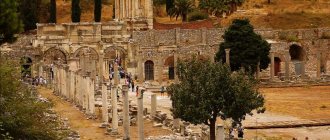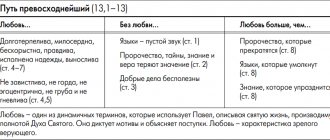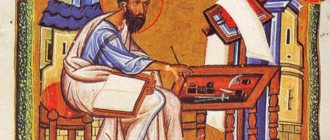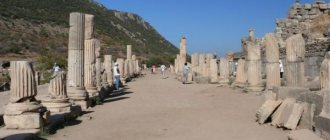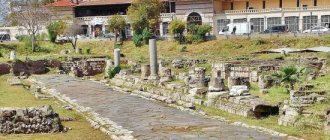The wondrous deeds of the Lord can be traced through the example of the life and miraculous conversion of the Holy Apostle Paul. A zealous persecutor of Christians in a short time turns to Christ and becomes a preacher of Christianity, and then even accepts martyrdom for his firm faith. What could be more wonderful? What more clearly testifies to the miracles of God than this short life devoted to serving Christ.
Saint Paul was not one of the twelve apostles and was not an apostle of the seventy, but he is called “the supreme one.” Why?
Origin of Paul
He was born in Cilicia, in the city of Tarsus, around the fifth - tenth year of our era. The exact date has not survived to this day. His name was Saul, most likely he was named after King Saul. His father was from the tribe of Benjamin, a true Pharisee. He also raised his son in the traditions of Pharisaism. He received Roman citizenship from his father. At that time, few people had it.
Saul's Latin name is Paul, which means "little one." Most likely, he had this meaning in mind when he called himself “the least of the apostles” in his letters.
From childhood, Saul studied Jewish law from Rabbi Gamaliel the Elder. He perfectly learned the Torah and its interpretation. In addition, Saul learned to make tents, which helped him later in life. If you remember his messages, he wrote that he provides himself with such a craft, and does not ask for alms.
It is not known whether Paul was married or remained a virgin. In his messages he hints that he is familiar with family life. This suggests that he was once married, maybe widowed. But legends call him a virgin along with the Apostle John the Theologian . It also became known from legends that his sisters, Zinaida and Philonila, became holy martyrs.
Saul was trained in rhetoric, philosophy, literature, and various languages. The techniques of ancient rhetoric are noticeably traced in his messages.
According to descriptions of that time, Saul was of average height, with fused eyebrows, bald and with a prominent nose.
The Bible, presented for family reading. Apostolic Epistles
About the Apostolic Epistles
| Holy Apostle John the Theologian. Fresco of the Sopočani Monastery |
The apostles and disciples of Jesus Christ, scattered throughout the then known world, zealously preached the Gospel (Good News) publicly to all nations.
The bright ray of truth that shone in Jerusalem spread further and further and illuminated the three great peninsulas of the ancient world: Asia Minor, Greece and Italy, reflecting its reflection on distant countries. The “Acts” does not clearly indicate the path followed by the first preachers of Christ’s teaching, about whom we know in more detail from the apostolic epistles and from traditions. All messages serve as a supplement and, as it were, an explanation of what is taught in the Gospels by the four evangelists: Matthew, Mark, Luke and John the Theologian, and are part of those sacred books that are known as the Bible. As the Apostles spread the Gospel orally, written messages became necessary, since the Apostles, founding Christian Churches in the different places they visited, could not remain constantly in one place, and in their absence, the newly formed Churches were in danger of both weakening faith and the deviation of converts from a new path, fraught with difficulties and suffering, requiring consolation, reinforcement, admonition and encouragement of the new converts. For this purpose, the apostles wrote their letters at different times to different individuals, communities and the Christian Churches they established.
The Orthodox Church recognizes 21 such epistles, namely: 1) the epistle of the Apostle James, brother of the Lord; 2–3) two epistles of the supreme apostle Peter; 4–6) three letters of the Apostle John the Theologian; 7) the letter of the Apostle Jude; the epistle of the supreme apostle Paul to the Romans; his: 9–10) two epistles to the Corinthians; 11) to the Galatians; 12) to the Ephesians; 13) to the Philippians; 14) to the Colossians; 15–16) two letters to the Thessalonians; 17–18) two letters to Timothy; 19) to Titus; 20) to Philemon and 21) to the Jews.
2–3) two epistles of the supreme apostle Peter; 4–6) three letters of the Apostle John the Theologian; 7) the letter of the Apostle Jude; the epistle of the supreme apostle Paul to the Romans; his: 9–10) two epistles to the Corinthians; 11) to the Galatians; 12) to the Ephesians; 13) to the Philippians; 14) to the Colossians; 15–16) two letters to the Thessalonians; 17–18) two letters to Timothy; 19) to Titus; 20) to Philemon and 21) to the Jews.
All these messages are fully consistent with the spirit of the Gospel, and reading them is necessary and obligatory for those who are trying to establish themselves in the truths of the teachings of Christ and to be as fully enlightened as possible by them and to assimilate them to themselves.
From the letters of the apostles James, Peter, John, Jude
“If any of you lacks wisdom,” the holy Apostle James admonishes the newly converted in their hesitation, “let him ask God, who gives to all simply and without reproach, and it will be given to him.” But let him ask with faith, without any doubt, because he who doubts is like a wave of the sea, lifted and tossed by the wind. Let such a person not think of receiving anything from the Lord. A man with double thoughts is not firm in all his ways.” (James 1:5–8)
“Receive with meekness the implanted word, which is able to save your souls. Be doers of the word, and not only hearers, deceiving yourselves. If anyone among you thinks that he is pious and does not bridle his tongue, but deceives his own heart, his piety is empty.
What good is it, my brothers, if someone says he has faith but does not have works? can this faith save him? If a brother or sister is naked and does not have daily food, and one of you says to them: “Go in peace, be warmed and fed,” but does not give them what they need for the body, what is the benefit? Likewise, faith, if it does not have works, is dead in itself.
Was not Abraham our father justified by works when he offered Isaac his son on the altar?
Do you see that faith contributed to his works, and by works faith was made perfect? And the word of Scripture was fulfilled: “Abraham believed God, and it was counted to him as righteousness, and he was called the friend of God.”
Do you see that a person is justified by works, and not by faith alone? For just as the body without the spirit is dead, so faith without works is dead.” (James 1, 21–22, 26; 2, 14–17, 21–24, 26)
Knowing from experience how the best feelings sometimes weaken in the soul, the holy Apostle Peter touchingly convinces the believers: “Beloved! I ask you to lead a virtuous life among the pagans, so that for what they slander you as evildoers, when they see your good deeds, they glorify God on the day of visitation. For this is the will of God, that by doing good we should stop the ignorance of people. Be sober and watchful, because your adversary the devil walks around like a roaring lion, looking for someone to devour. Resist him with firm faith. Cast all your worries on God, for He cares for you. Most of all, have fervent love for one another, because love covers a multitude of sins. Serve one another, each with the gift that you have received, as stewards of the manifold grace of God.” (1 Pet. 2, 11–12, 15; 5, 8–9, 7; 4, 8, 10)
“Show in your faith virtue, in virtue knowledge, in knowledge self-control, in self-control patience, in patience godliness, in godliness brotherly kindness, in brotherly kindness love.
If this is in you and multiplies, then you will not be left without success and fruit in the knowledge of our Lord Jesus Christ, and thus free entry into the eternal Kingdom of our Lord and Savior Jesus Christ will be opened for you.
If, having escaped the defilements of the world through the knowledge of our Lord and Savior Jesus Christ, they again become entangled in them and are overcome by them, then the latter is worse for them than the first. It would be better for them not to know the path of righteousness than, having learned it, to turn back from the holy commandment handed down to them. But what happens to them is according to the true proverb: the dog returns to his vomit, and the washed pig goes to wallow in the mud.
The Lord is not slack in fulfilling his promise, as some consider slackness; but he is patient with us, not wanting anyone to perish, but everyone to come to repentance. The day of the Lord will come like a thief in the night, and then the heavens will pass away with a noise, the elements, having flared up, will be destroyed, the earth and all the works on it will be burned up. If in this way all this is destroyed, then what should you be like in holy life and piety, who are waiting and desiring the coming of the day of God, in which the flaming heavens will be destroyed and the burning elements will melt? However, according to His promise, we look forward to a new heaven and a new earth, in which righteousness dwells. Therefore, beloved, being forewarned of this, beware lest you be carried away by the error of the wicked and fall from your own affirmation, but grow in grace and in the knowledge of our Lord and Savior Jesus Christ. To him be glory both now and to the day of eternity. Amen". (2 Pet. 1, 5–8, 11; 2, 20–22; 3, 9–13, 17–18)
The epistles of the holy Apostle John the Theologian contain, in addition to the dogmas of the Christian faith, instructions imbued with love regarding active love bequeathed by the Divine Teacher.
“I write to you, my children,” the Apostle John addresses the believers, that “he who loves his brother abides in the light, and there is no offense in him.” “But he who hates his brother is in darkness, and walks in darkness, and does not know where he is going, because the darkness has blinded his eyes.” (1 John 2, 10–11)
“Look what love the Father has given us, that we should be called children of God. Beloved! we are now children of God; but it has not yet been revealed what we will be. We only know that when it is revealed, we will be like Him, because we will see Him as He is.
We know that we have passed from death to life because we love our brothers; He who does not love his brother remains in death. Anyone who hates his brother is a murderer.
We have come to know love in the fact that He laid down His life for us: and we must lay down our lives for our brothers. My children! Let us begin to love not in word or tongue, but in deed and truth. He who does not love has not known God, because God is love. And he who abides in love abides in God, and God in him. There is no fear in love, but perfect love casts out fear, because in fear there is torment. He who fears is imperfect in love." (1 John 3, 1–2, 14–16, 18; 4, 8, 16, 18)
“And now I ask you, lady, not as a new commandment prescribing to you, but the one that we have had from the beginning, that we love one another. Love is that we act according to His commandments. This is the commandment which you heard from the beginning, that you should walk in it.
For many deceivers have entered into the world, not confessing Jesus Christ who has come in the flesh: such a person is a deceiver and Antichrist.” (2 John 1, 5–7)
“I have no greater joy than to hear that my children walk in the truth. Beloved! You act faithfully in what you do for the brothers and for the strangers.
Beloved! do not imitate evil, but imitate good. He who does good is from God; but he who does evil has not seen God.” (3 John 1, 4–5, 11)
In his letter to the believers, the holy Apostle Jude warns them against false teachers and threatens that, just as it happened with Sodom and Gomorrah, “so it will certainly be with these dreamers, who slander what they do not know,” murmurers, not satisfied with anything, whose lips utter pompous words; these people are “waterless clouds carried by the wind; autumn trees, barren, twice dead, uprooted; fierce sea waves, foaming with their shame; wandering stars, to whom is reserved the darkness of darkness forever.” (Jude 1, 8, 10, 12–13)
Persecution of Christians
In those days, persecution of Christians by the Pharisees was common. This was due to Christian public preaching, which was incompatible with Orthodox Judaism. Firstly, death on the cross was considered the most shameful for Jews. This is how they dealt with especially dangerous criminals. And the Jews were waiting for the Messiah, as the king of Israel, who was to come in all pomp and majesty.
Secondly, many Christian sermons denounced the cult of the Israelite temple. This did not suit the Pharisees; it even offended their religious feelings.
Saul, as a zealous Pharisee, before his miraculous conversion, was a participant in the persecution of Christians and even took part in some reprisals against them. In particular, the book of the Acts of the Apostles described in detail how, during the execution of the holy protomartyr Stephen, Saul guarded the outer garments of his brothers who were stoning the martyr.
Other punishments for Christians were: scourging (forty blows in five rounds) and imprisonment. But stoning was the most cruel execution. Even watching such a procedure was very difficult; the spectacle is not for the faint of heart. And Saul calmly watched this, guarding the clothes of the Pharisees’ executioners. Most likely, his heart was very hardened then.
Conversion to Christ
And Christ was able to turn such a cruel and impenetrable person to Himself and melt his iron heart. In the Acts of the Apostles this miracle is described in great detail.
Saul was then about thirty years old, and he was walking along the road to Damascus. Suddenly, unexpectedly, a light came down from the sky and blinded him. Then he heard a voice reproaching him: “Saul, why are you persecuting Me?!” It was probably the voice of Christ Himself. After all, when he took part in the persecution of Christians, tormented them, he tortured Christ Himself, according to the Gospel word: “if you did it to one of the least of these, you did it to Me.”
The rest of the people did not hear this voice. After this miraculous appearance, Saul became blind and remained in this state for three whole days. He was brought to Damascus, where he was baptized by the Apostle Ananias. After baptism, Saul's sight returned.
In such a miraculous way, the ardent persecutor of Christians became a Christian himself in just three days. From then on his name became “Paul”.
Beginning of Paul's sermons
Immediately after his baptism, Paul went to his first Christian sermon. It was for the inhabitants of Arabia (the Jews also lived there). After this, he returned to Damascus, where King Aretas pursued him.
Paul then goes to Jerusalem. But the residents of this city remembered Paul as a furious persecutor of Christians, and here he addresses everyone with a Christian sermon. They could not believe such a rapid change in his outlook, so they were afraid of him. The apostles especially did not accept him. Only the assurance of the Apostle Barnabas helped correct the matter.
Then Paul went to his hometown, from where he and Barnabas went to Antioch. From there he went on his first apostolic journey around the world.
Because of the controversy over circumcision, the first apostolic council was convened in Jerusalem. On it, Paul put forward the version that there is no need for Christians to undergo circumcision. The other apostles also accepted his point of view. But when he came to Antioch, he had disputes with the Apostle Peter about this.
Blessed Theodoret of Cyrus as an interpreter of the Epistles of the Holy Apostle Paul
It is difficult to overestimate the importance for the teaching of the Church and the spiritual life of a Christian of exegesis - the interpretation of Holy Scripture by the holy fathers of the Church and church writers. This part of the Holy Tradition of the Church is of particular interest: it seems to bring together the Holy Scripture and the Holy Tradition - these two pillars on which Church teaching is based. But especially important is the exegesis of the New Testament - books of paramount importance for every Christian, books by which he is called to live and control his life. And despite the fact that the Gospels are in first place among them, since they most reflect the earthly life of the Lord Jesus Christ, His incarnation, preaching, suffering, death on the cross, resurrection and ascension to heaven (a large number of church interpretations also speak about the meaning of the Gospels these books), but the Apostolic Epistles are also important, among which the majority are the Epistles of the Apostle of the Gentiles - the Holy Apostle Paul. It was to them that Blessed Theodoret of Cyrus (393–466) dedicated his “Commentary on the Fourteen Epistles of the Holy Apostle Paul,” which is published in this book.
About the life, works and theological activity of Bl. Theodoret, this major representative of the Christian Antiochian school of the 5th century, theologian, exegete and church historian, not many works were written in Russian, but deep and detailed ones.
If we briefly outline his life, we can say that it was full of events, often quite dramatic. The future Bishop of Cyrus was born around 393 into a noble Christian family in Antioch and it was not by chance that he received the name “Theodoret” (“given by God”). He was begged from God by his parents, who had no children for a long time and turned for prayerful help to famous holy ascetics who lived in the vicinity of Antioch.
Theodoret received lessons in holiness from these Syrian saints of God, but, in addition, he learned from them various secular sciences. According to N.N. Glubokovsky, “there is not a single area of knowledge that would remain unknown to Theodoret. Philosophy, history, astronomy, medicine, geometry: all these and other sciences were the property of the mind of the learned bishop." Regarding theological education, as A.I. Sidorov notes, “it is no less (if not more) likely to assume that young Theodoret mastered Christian science on his own through diligent reading of the Holy Scriptures and the works of the holy fathers.” Indeed, the Holy Scripture became spiritual food for him even from his childhood: Theodoret could hear certain biblical stories from the holy ascetics of Antioch; from childhood he was instilled with a taste for the beauty of the psalms; at services in Antioch, where Theodoret went with his parents, the words of the Holy One were heard Scriptures. At the age of 16 he became a reader in church, and this explains the fact that he knew the Scriptures well. It was in this way, as one might assume, that Theodoret not only deeply studied the Bible, but also assimilated the exegetical and theological principles of the Antiochene theological tradition, which he then embodied in his numerous creations.
Inflamed with the desire to please God in a monastic form, Theodoret settled in the Nikert monastery not far from Apamea. Here for the formation of the blzh. Theodoret as an exegete could have been influenced by his acquaintance with the local bishop - Polychronius of Apamea (died before 431), a famous exegete and brother of Theodore of Mopsuestia. C. Moreschini and E. Norelli note that Bl. Theodoret, “like his Antiochene predecessors, was engaged in exegetical works throughout his life. And just like his predecessors, exegesis cannot be separated from his theological reflections... Born into a Christian family, from his youth he devoted himself to the reading of the Sacred Texts, even if his exegetical training and refinement of method came to him later - in the monastery of Nikert ".
Paul's second and third apostolic journeys
Paul went on his second journey with the apostle Silas. In the city of Lystra he met Timothy. He becomes Paul's student, and then they travel together. The path lay to Europe. They visited Philippi, where Paul was briefly detained. Then we went to Thessalonica. In Athens, Paul met Dionysius the Areopagite. Then they went to Corinth, where they met a pious couple - Priscilla and Aquila. Then they returned to Jerusalem.
The third journey began in Ephesus, where Paul wrote his first letter to the Corinthians and Galatians . He then went to Macedonia, where the second letter to the Corinthians .
Then Paul visited Hellas, Philippi, Troas and Tyre. The Epistle to the Romans was written here .
The main themes of the Epistles of St. Paul and the theology of the Ancient Church
It is not difficult to see that the Message is united not only by the time of writing, but also by the main meaning, because each was written in connection with a specific historical and cultural occasion. The letters to the Thessalonians were written in anticipation of the Second Coming. The letters to the Corinthians are prompted by problems of church discipline, order during worship, questions of spiritual gifts, and the difficulty of collecting alms. The letters written from the first Roman bonds reveal the divine-human nature of Christ and introduce the concepts of kenosis. The book of Hebrews exemplifies biblical theology with a primarily Christological focus. The Pastoral Epistles are filled with instructions for bishops and deal with issues of governing the Church. In this case, the main theme of each Epistle becomes a theological theme [Table]:
| № | Year | Message | The main theme of the Message | Theme of all Messages |
| 1 | 51 | 1 Thessalonians | Eschatology | THEOLOGY OF THE CHURCH |
| 2 | 52 | 2 Thessalonians | ||
| 3 | 55 | 1 Corinthians | Ecclesiology | |
| 4 | 58 | 2 Corinthians | ||
| 5 | 58 | Galatians | Soteriology | |
| 6 | 58 | Romans | ||
| 7 | 61 | Ephesians | Christology | |
| 8 | 61 | Colossians | ||
| 9 | 63 | Hebrews | ||
| 10 | 63 | Philemon | ||
| 11 | 63 | Philippians | ||
| 12 | 65 | 1 Timothy | Pastoral | |
| 13 | 65 | Titu | ||
| 14 | 67 | 2 Timothy |
This thematic detail shows the fairness of presenting the Epistles of the Holy Apostle Paul as an integral text, united by a common theme and revealing the theology of the Apostolic Church in the Revelation of the New Testament.
Grouping the Epistles according to dogmatic topics allows us to draw a number of theoretical and practical conclusions [Fig. 6].
In theoretical terms, this method gives results in the field of biblical theology, isagogy and the history of the Apostolic Church.
Firstly
, we received a clear idea of the Epistles as an integral theological text, the main content of which is dogmatic. Thus, the place of the Pauline corpus in the system of themes of the New Testament is confirmed: it is in his Epistles that the theology of the Church is revealed to us. We see how gradually the theology of the Ancient Church takes on the distinct form of a complete theological system, containing all sections of dogmatic theology in the form in which dogmatics is usually structured today. The arrangement of the Epistles in chronological order allows us to identify the process of genesis of the theology of the Apostle Paul. We can say that the sections of theology revealed by the Apostle Paul are in full accordance with the logic of the historical development of the Ancient Church. Thus, in the Epistles of the Holy Apostle Paul we see the consistent development of the system of theology of the Ancient Church.
Secondly
, it is the patristic conclusions traditional for Orthodoxy about the time, place and author of the writing of the Epistles of the Apostle Paul that make it possible to build a coherent and historically consistent picture. The time, place and reason for writing the Messages receive a thematic justification. This is especially true of Galatians and Hebrews. The North Galatian theory turns out to be the most consistent with the realities of the Ancient Church; accordingly, the very early dating of the Epistle to the Galatians does not allow us to link the historical and theological aspects of apostolic history together. The Epistle to the Hebrews, as Christological, cannot occupy any other place in such a system than among the Christological Epistles written in the first Roman bonds, 61-63. Accordingly, the dating of this Epistle according to Blessed Theodoret of Cyrus seems most reasonable. The question of the authorship of the Epistle to the Hebrews is also being resolved: among the New Testament writings it has no place anywhere than among the Epistles of the Apostle Paul. Accordingly, no one except the Apostle Paul and except during the first Roman bonds could write such an Epistle. Otherwise, it completely falls out of the logic of both the New Testament and the history of the Apostolic Church. Thus, we come to a broader problem: isagogical information turns out to be not at all secondary, they are the main ones, it is with them, according to the thoughts of the Fathers, that the study of the books of Scripture should begin, and it is they that form not only the historical, but also the dogmatic context of the Epistles.
Third
, we can talk about a deeper picture of the history of the Apostolic Church. It represents not only the sequence of events, but also the emergence of theological, pastoral, liturgical problems in the process of the formation and development of Christian communities. We can talk about a closer relationship between the Acts of the Apostles and the Epistles of the Holy Apostle Paul in relation to the history of the Ancient Church. It is necessary to use the biography of the Apostle Paul in a new way to study New Testament history. If we use the biographies of other apostles and the Council Epistles and Gospels in the chronological sequence of their occurrence, then we will be able to build a complex, systematic picture of what happened in the first century.
Paul's trial
In Jerusalem, the accusation was raised against him that he allowed the pagans to go to Solomon's temple. At the trial in the Sanhedrin, where Paul was brought, a dispute took place between the Sadducees and the Pharisees. Due to his Roman citizenship, Paul could not be executed. He was sent to the procurator Felix for trial, who left him in prison. The procurator sent him to Italy to the emperor for trial.
Paul is then sent away on a ship as a prisoner. But near the island of Melit the ship is wrecked. Then he goes to Syracuse and Rome. Here he lived for two years and wrote many of his messages. In them he lists his sufferings and ordeals that he had to endure for Christ during his sermons. They also describe miracles, such as the opening by an angel of the prison where Paul and others were.
Epistles of St. Paul the Apostle
“I am the least of the apostles, and am not worthy to be called an apostle, because I persecuted the church of God; But by the grace of God I am what I am, and His grace in me was not in vain” (1 Cor. 15:9, 10). This is how the Apostle Paul characterizes himself! Endowed by nature with rich mental abilities, he was raised and trained in the strict rules of the Pharisees, and, according to his own opinion, he succeeded in Judaism more than many of his peers in his kind, for he was an immoderate zealot of his fatherly traditions (Gal. 1:14) . When the Lord, who chose him from his mother’s womb, subsequently called him to apostolic service; then he transferred all the energy and all the strength of his great spirit and devoted it to preaching the name of Christ among the pagan world, as well as among his blind relatives who were bitter against Christ. Studying the life and apostolic works of St. Apostle. Paul according to the book “Acts of the Apostles”, one can truly be amazed at the indestructible energy of the great Apostle of Languages. It is difficult to imagine that a person who did not have a powerful body and strong physical strength, like St. Paul (Gal. 4:13, 14), could endure as many incredible difficulties and dangers as the Apostle Paul had to endure and endure for the glory of the name of Christ. But in the course of these difficulties and dangers, not only did his jealousy and energy not diminish, but, on the contrary, increased and became tempered like steel. Forced to remember his exploits for the Corinthians, he numbers them in this way. “I am much more (my rivals) in labor, immensely in wounds, more in prison, and many times near death. Five times the Jews gave me forty stripes minus one. Three times I was beaten with sticks, once I was stoned, three times I was shipwrecked, and spent a night and a day in the depths of the sea. Many times I was on travels, in dangers on rivers, in dangers from robbers, in dangers from fellow tribesmen, in dangers from pagans, in dangers in the city, in dangers in the desert, in dangers at sea, in dangers among false brothers. In labor and exhaustion, often in vigil, in hunger and thirst, often in fasting, in cold and nakedness, etc.” (2 Cor. 11:23–27). So, comparing himself with the other Apostles and out of humility calling himself lesser than them, St. Apostle. Paul, in all fairness, could declare: “But I have labored more than all of them: not I, however, but the grace of God which is with me” (1 Cor. 15:10). For, indeed, without grace-filled help it is impossible for a person to accomplish the exploits of Pavlov. The same strength of spirit, unfailing directness of speech and steadfastness in convictions that St. Apostle displayed. Paul, before kings and rulers, as well as before whole crowds of his opponents and enemies, he also showed in his relations with his fellow Apostles. Thus, one day, he did not hesitate to denounce the Apostle Peter himself in front of everyone when he turned out to be disgraceful, that is, he gave rise to reproach in the capital of paganism in Asia Minor - Antioch (Gal. 2:11-14).
As a sacred writer, St. Apostle. Paul surpasses all other Apostles in the number of his writings. Planting separate Christian churches everywhere throughout the vast expanse of Asia Minor and Europe, he did not limit himself to building them indirectly or directly only during his personal presence, but did not interrupt spiritual communication with them even during his absence, clarifying their perplexities and questions, strengthening their faith , comforting in sorrows, etc. The totality of Paul’s epistles in volume is equal to almost a third of the entire composition of the New Testament holy books. They reflected the extensive learning and familiarity of the Apostle Paul with the sacred scriptures of the Old Testament, as well as the depth in the disclosure of the New Testament teachings of Christ, the fruit of which was a whole series of new words and sayings of a dogmatic or moralizing nature, belonging exclusively to the Apostle Paul, for example: to be resurrected, to be buried Christ, to put on Christ, to put off the old man, to be saved by the washing of the new world, the law of the spirit of life, another law in spirit, warring against the law of the mind, etc. The style of Paul's epistles reflected both the power of his thought and his energetic character. With the liveliness of the expression, “conciseness of speech, relatively frequent use of fragmentary sentences, ellipses and parenteses (i.e., sometimes omissions, sometimes parenthetical insertions), together with oppositions, questions, and amplifications that enliven speech—these are the distinctive features of Pavlov’s language” (Introduction to the New Book. books of Archimandrite Mikh. vol. 2, 1869).
Fourth Apostolic Journey
After this, Paul was released and went on his fourth apostolic journey. He visited the churches he had founded earlier. Titus was ordained bishop by Paul on the island of Crete. He then ordained Timothy as Bishop of Ephesus. In Corinth he met Peter and went with him to Rome.
Paul then visited Spain, after which he returned to Rome, where he was captured. From prison he wrote his second letter to Timothy .
last years of life
While imprisoned in Rome, Paul was sentenced to death. But as a Roman citizen he could not be crucified. So they cut off his head with a sword. This happened under Nero in the sixties. The exact date of his death is unknown.
A memorial sign was erected at the site of his burial. Later, the temple of San Paolo fuori le Mura was built on this site.
Catholics celebrate his memory on June 29th. Orthodox Christians celebrate July 12th according to the Julian calendar. Since the two apostles, Peter and Paul, served the cause of enlightenment most of all, they are called the “highest apostles.”
Discovery of relics
In 2009, the Pope issued a decree to examine the relics that were in the temple of San Paolo Fuori le Mura. But the stone of the sarcophagus turned out to be too thick. Therefore, a special probe was inserted into it through the hole, through which the remains were examined. Bones and parts of preserved tissue were discovered.
After the research is completed, perhaps the sarcophagus with the relics will be opened for worship in Rome (if the examples of remains found match the description of the apostle’s appearance).
The first conciliar letter of the holy Apostle John the Theologian
Share
Apostle John the Theologian
1 John, 70 credits, II, 7-17.
Chapter 2.
7 Beloved! I am not writing to you a new commandment, but an ancient commandment which you had from the beginning. The ancient commandment is the word that you have heard from the beginning.
8 But moreover, I am writing you a new commandment, which is true both in Him and in you: because the darkness is passing away and the true light is already shining.
9 He who says that he is in the light, but hates his brother, is still in darkness.
10 He who loves his brother abides in the light, and there is no offense in him.
11 But he who hates his brother is in darkness, and walks in darkness, and does not know where he is going, because the darkness has blinded his eyes.
12 I am writing to you, children, because your sins have been forgiven for His name’s sake.
13 I am writing to you, fathers, because you knew Him from the beginning. I am writing to you, young men, because you have overcome the evil one. I am writing to you, youths, because you have come to know the Father.
14 I have written to you, fathers, because you have known the One without Beginning. I wrote to you, young men, because you are strong, and the word of God abides in you, and you have overcome the evil one.
15 Do not love the world, nor the things in the world: if anyone loves the world, the love of the Father is not in him.
16 For everything that is in the world, the lust of the flesh, the lust of the eyes, and the pride of life, is not from the Father, but from this world.
17 And the world passes away, and its lusts, but he who does the will of God abides forever.
Priest Stefan Domuschi comments.
Today's reading begins with the Apostle John reminding the disciples of the ancient commandment that they heard “from the beginning.” One might think that “the beginning” refers to the beginning of the preaching of Christ or the apostles themselves, but in a biblical context the beginning is more than just a starting point. The Evangelist himself begins his Gospel with the words: “In the beginning was the Word and the Word was with God.” Long before him, the prophet Moses began the book of Genesis like this: “In the beginning God created the heavens and the earth.” It may seem to us that these are completely different texts, but on a deeper level they are united by one theme, they both write about love. Thus, the Father and the Son and the Spirit are in love, and God creates the world because this love tends to extend to others.
At the same time, this commandment turns out to be new because the conditions in which it exists have changed. It is no coincidence that, turning to the disciples, Christ says to them: I give you a new commandment, that you love one another, as I have loved you. The call to love already sounded in the Old Testament, but it received a completely different force thanks to the sacrificial love of the God-man.
In the Greek language there were different words that denoted love: passion, friendship, affection, but in order to describe the love of Christ, the evangelists choose a word that denotes rational and spiritual love. The one that is in our power. That is why the one who previously could say, I love one and hate the other, no longer has the right to do so. Not with this love, at least, because if it really fills the heart, there simply cannot be room for hatred in it. This could be said if we were talking about feelings, but the love of Christ is higher than feelings.
It may be scary for us, ordinary living people of flesh and blood, to hear such categorical statements. Life is difficult and sometimes we don’t choose reasons to hate, they come on their own. What should we do?
I think we need to take into account that since Christ understands a state of will by love, hatred also means a state that we freely choose. Of course, we should strive to control our feelings, but the responsibility is primarily for conscious decisions.
However, the reading ends with a paradoxical call-statement: “whoever loves the world does not have the Father’s love.” The question immediately arises: didn’t John write: “God so loved the world that he gave his only begotten Son”? How to combine this?
God loves the world, but He intended it to be different and He is leading it to this different state. However, since the Fall, man has created his own distorted world from God’s world. It is far from perfect, filled with struggle and suffering... But God’s peace has not disappeared anywhere, It seems to shine through all these troubles and misfortunes. This world opens up in the lives of people who live by its laws. That is why they find the strength to rejoice, no matter what.
